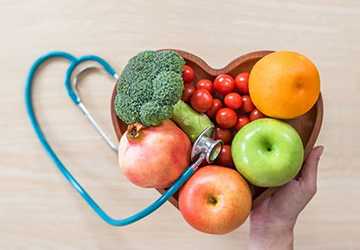A heart-healthy diet is essential for overall cardiovascular health, and eating nutrient-dense foods can significantly boost heart health. According to expert advice from nutritionists and cardiologists, certain foods positively affect heart function and can reduce the risk of cardiovascular disease. Based on expert advice, this guide explores five of the best foods for heart health.

1. Fatty Fish: Omega-3 Energy Source
Expert tip: Add fatty fish to your diet
Fatty fish such as salmon, mackerel, trout and sardines are rich in omega-3 fatty acids, known for their heart-protective effects. The American Heart Association recommends eating fatty fish at least twice weekly to support cardiovascular health.
Critical benefits for heart health:
● Omega-3 fatty acids: These essential fats may reduce the risk of heart disease by lowering blood pressure, improving cholesterol levels and reducing inflammation.
● Reduces the risk of arrhythmia: Omega-3 fatty acids can help maintain a stable heartbeat and reduce the risk of cardiac arrhythmia.
● Improves blood vessel function: The anti-inflammatory properties of omega-3 fatty acids help improve blood vessel function and promote healthy blood circulation.
Incorporate fatty fish into your diet:
● Grill or bake: Prepare fish by grilling or baking it to retain nutritional value without adding unhealthy fats.
● Salmon Salad: Add salmon, leafy greens, and various colourful vegetables for extra nutrients.
● Omega-3 supplements: If you have trouble meeting recommended intakes through diet alone, consider taking an omega-3 supplement.
2. Berries: Antioxidant-Rich Superstars
Expert tip: Consider berries a heart-healthy snack
Berries, including strawberries, blueberries, raspberries and blackberries, are rich in antioxidants, vitamins and fibre. Nutritionists often recommend adding a variety of berries to your diet as a delicious and heart-healthy snack.
Critical benefits for heart health:
● Antioxidants: Berries contain potent antioxidants such as anthocyanins, which help neutralize free radicals and reduce oxidative stress on the heart.
● Fiber content: The fibre in berries helps lower cholesterol, improves heart health by regulating sugar, and reduces inflammation.
● Vitamins and minerals: Berries provide essential nutrients such as vitamin C, potassium and folate, which play a vital role in heart health.
Incorporate berries into your diet:
● Smoothies: Blend mixed berries with yoghurt or plant-based alternatives for a refreshing, heart-healthy smoothie.
● Snack Bowls: Make snack bowls with various berries to provide a nutritious and filling feeling.
● Add to breakfast: Sprinkle berries over oatmeal, yoghurt or whole-grain cereal for added flavour and nutrition.
3. Nuts: Nutrient-Rich Heart Booster
Expert tip: Eat a handful of nuts every day
Nuts, including almonds, walnuts, pistachios and cashews, are an excellent source of heart-healthy fats, fibre and various nutrients. Nutrition experts often recommend adding a handful of nuts to your daily diet as a heart-boosting snack.
Critical benefits for heart health:
● Healthy fats: Nuts are rich in monounsaturated and polyunsaturated fats, which can help improve cholesterol levels and overall heart health.
● Omega-3 fatty acids: Some nuts, such as walnuts, contain alpha-linolenic acid (ALA), a plant-based Omega-3 fatty acid with cardiovascular benefits.
● Fiber and antioxidants: The combination of fibre and antioxidants in nuts supports heart health by reducing inflammation and improving blood vessel function.
Incorporate nuts into your diet:
● Assorted fruits: Mix nuts and dried fruits to make heart-healthy assorted fruits a convenient and nutritious snack.
● Nut butter: Spread nut butter on whole wheat toast or use it as a dip for fruits and vegetables.
● Salad Topping: Sprinkle chopped nuts over your salad to add crunch, flavour and heart-healthy nutrients.

4. Green Leafy Vegetables: Rich in Nutrients
Expert advice: Eat leafy vegetables often
Green leafy vegetables like spinach, kale, and chard are nutrient-dense vegetables with many heart-protective benefits. Cardiologists and nutritionists recommend including leafy green vegetables in meals to support cardiovascular health.
Critical benefits for heart health:
● Rich in vitamins and minerals: Leafy vegetables provide essential nutrients such as vitamin K, potassium and folate, which support heart health.
● Dietary nitrates: Nitrate-rich greens support blood vessel function, helping to regulate blood pressure
and improve overall cardiovascular performance.
● Fiber content: The fibre in leafy green vegetables helps lower cholesterol, lower blood pressure and promote digestive health.
● Antioxidants: Green leafy vegetables contain antioxidants, including beta-carotene and lutein. It protects the heart by fighting oxidative stress.
Incorporate leafy green vegetables into your diet:
● Salads: Mix leafy greens, colourful vegetables and heart-healthy dressings for a vibrant salad.
● Smoothies: Add a handful of spinach or kale to your morning smoothie for a nutritional boost without sacrificing flavour.
● Saute or steam: Sauté or steam leafy greens with olive oil and garlic for an easy and nutritious side dish.
5. Oats: A Heart-Healthy Whole Grain
Expert tip: Start your day with oats
Oats, whether rolled or overnight, are known for their heart-healthy properties. Nutritionists often recommend oats as a nutritious and filling breakfast option to protect your heart and start your day right.
Critical benefits for heart health:
● Soluble fibre: Oats contain beta-glucan, a soluble fibre that helps lower cholesterol levels by binding cholesterol to the body and expelling it from the body.
● Antioxidants: Oats are rich in antioxidants, including oatamides, which have anti-inflammatory and vasodilatory properties and may support heart health.
● Stable blood sugar levels: The complex carbohydrates in oats ensure a sustained release of energy, thereby supporting stable blood sugar levels.
Incorporate oats into your diet:
● Oatmeal: Enjoy a warm bowl of oatmeal with berries, nuts and a drizzle of honey for a heart-healthy breakfast.
● Overnight Oats: Soak overnight oats in milk or a dairy-free alternative and add fruit and nuts for a convenient and nutritious breakfast.
● Oatmeal snacks: Choose snacks made from whole-grain oats, such as granola or oatmeal cookies, for a heart-healthy alternative.
Conclusion:
While these expert-recommended foods support heart health, viewing nutrition in a balanced and varied diet is also essential. A heart-healthy diet includes a variety of nutrient-dense foods, including fruits, vegetables, whole grains, lean proteins, and healthy fats.
Additionally, individual nutritional needs may vary, and consulting a physician or registered dietitian can provide personalized recommendations based on specific health considerations and goals.
In addition to heart-healthy foods, maintaining an active lifestyle, managing stress, and avoiding smoking are crucial to cardiovascular health. By combining a nutritious diet with a holistic approach to health, individuals can take proactive steps to promote heart health and reduce the risk of cardiovascular disease. Remember that small, consistent changes in your eating habits can have a significant, lasting impact on your heart health.






